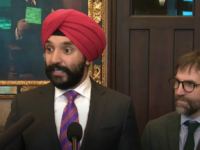The government’s decision to prorogue Parliament and launch a new legislative agenda later this month offers more than just an opportunity to recalibrate economic priorities in light of the COVID-19 global pandemic. My Globe and Mail op-ed notes that less than 12 months after the 2019 national election, Canada’s digital policy agenda has gone off the rails and is badly in need of a reboot.
Post Tagged with: "facebook"
As Heritage Minister Steven Guilbeault Plans Link Taxes and Internet Content Regulation, Where Is Navdeep Bains?
Canadian Heritage Minister Steven Guilbeault continued his media tour in support of link taxes and Internet content regulation yesterday with interviews in the Toronto Star and Radio-Canada. The Toronto Star compares technology companies to polluters, doubles down on calling social media linking to news articles without a licence “immoral”, questions why Facebook has said it will stop news sharing in Australia with mandated licensing (“I’m like, really guys”), and raises the possibility of using copyright to require payments for linking. In the Radio-Canada interview, he admits that Netflix already invests in Canada (CRTC chair Ian Scott says it is the biggest single contributor to film and television production in Canada) but that he wants regulation to raise hundreds of millions of dollars to support francophone, native, and minority community productions.
I’ve written extensively on why the claim that linking without a licence is immoral is wrong, why Facebook is right to push back against link licensing, and how Canadian film and television production is enjoying record success because of international streaming services, not in spite of them. But there is one line in the Radio-Canada that particularly caught my attention. When asked about the timing of a bill to mandate online Cancon, Guilbeault acknowledges that “obviously I am not the only minister [responsible] for the bill.”
Canadian Heritage Minister Guilbeault Says Social Media Sites Linking to News Content Without Payment is “Immoral”
Canadian Heritage Minister Steven Guilbeault appeared on The West Block over the weekend in an interview that provides a strong – and disturbing – sense of where the government is headed on Internet regulation. Most problematic was the discussion on compensation from social media companies such as Facebook to news organizations for allowing their users to link to news articles. As I discussed in a post last week examining recent developments in Australia:
Facebook users post many things – photos, videos, personal updates, and links to various content online, including news articles. Those news articles do not appear in full. Rather, they are merely links that send users to the original news site. From Facebook’s perspective, there is enormous value in referring users to media sites, who benefit from advertising revenue from the visits.
Facebook has said that it will block all news sharing on its platform in Australia if the government proceeds with a mandated payment system, noting the limited value of the links and arguing that its referrals that are worth hundreds of millions to the news organizations. If Canada were to pursue the same strategy, Canadian news sites would also likely be blocked and a trade complaint under the USMCA would be a virtual certainty.
There Are Many Serious Concerns About Facebook. Why the Australia News Fight Isn’t One of Them
Earlier this week, Facebook announced that it plans to stop allowing publishers and users to share news on both Facebook and Instagram in Australia. The decision came after months of public debate and private negotiations on potential payments from the social media giant to news organizations. When the Internet platforms and the news organizations led by Rupert Murdoch’s News Corp (by the far the largest media organization in Australia) were unable to arrive at a deal, the Australian government and its regulator announced that it would legislate a solution by requiring Google and Facebook to pay publishers for content posted by its users on its site. The Facebook decision to block news sharing on its platforms has been described as a “threat” to the government and democracy, leading to supportive op-eds calling on the Australian government to push back against the company. Canadian Heritage Minister Steven Guilbeault has denounced the move, stating “the Canadian government stands with our Australian partners and denounces any form of threats.”
There are many serious concerns about Facebook: it is in federal court in a battle over whether it violated Canadian privacy law, its response to potentially misleading political advertising has been inadequate, it has moved too slowly in removing posts that urge violence, it faces antitrust investigations, it has paid billions in penalties for its conduct, and many simply fear it is too powerful. But it is in the right in this battle over news in Australia and the Canadian government would be wrong to emulate the Australian approach.
The LawBytes Podcast, Episode 53: Welcome Development or Waste of Time? – A Conversation With Facebook Oversight Board Member Nicolas Suzor
Last month, Facebook revealed the names of the first 20 members of the Facebook Oversight Board, a body charged with conducting independent reviews of content removals. The group includes many well-known experts in the fields of human rights, journalism, law, and social media. The announcement received at best a mixed greeting – some welcomed the experiment in content moderation, while others argued that the board “will have no influence over anything that really matters in the world.”
Professor Nicolas Suzor of the Queensland University of Technology in Australia was named as one of the first 20 members. The author of Lawless: The Secret Rules that Govern our Digital Lives, Nicolas has been critical of Facebook and other Internet platforms and raised concerns about the oversight board when it was first announced. He joins me on the podcast to discuss the oversight board, the initial criticisms, and his views on how the board can have a positive impact in addressing complex issues that strive to balance freedom of expression with concerns about online harms. Note that our conversation was recorded before President Donald Trump issued an executive order targeting Internet platforms after Twitter fact-checked one of his tweets and issued a warning on another. The podcast will examine those latest developments in a future episode.











